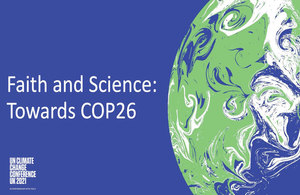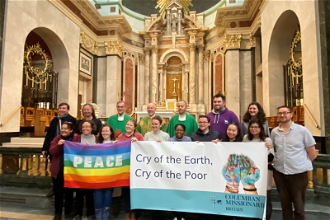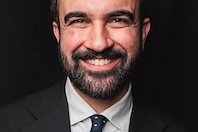Joint Appeal ahead of COP26 from faith leaders and scientists

Source: Vatican News, UK Government
'We have inherited a garden. We must not leave a desert to our children.' -
Today, faith leaders representing the world's major religions joined scientists at the Vatican to call on the international community to raise their ambition and step up their climate action ahead of COP26. Almost 40 faith leaders signed a joint Appeal, which was presented by Pope Francis to COP26 President-Designate, the Rt Hon Alok Sharma, and the Italian Minister for Foreign Affairs, Hon. Luigi Di Maio.
Signatories include high-profile representatives from across the Christian denominations, both Sunni and Shi'a Islam, Judaism, Hinduism, Sikhism, Buddhism, Confucianism, Taoism, Zoroastrianism and Jainism - representing a broad range of faith leaders.
The Appeal:
Calls for the world to achieve net-zero carbon emissions as soon as possible, to limit the global average temperature rise to 1.5 degrees above pre-industrial levels;
Presses wealthier nations and those with the greatest responsibility to take the lead, stepping up their climate action at home and financially supporting vulnerable countries to adapt to and address climate change.
Urges governments to raise their ambition and their international cooperation to transition to clean energy and to sustainable land use practices, environmentally friendly food systems and responsible financing.
Commits the faith leaders themselves to greater climate action. Notably, doing more to educate and influence members of their traditions and actively participating in the public debate on environmental issues. The faith leaders will also support action to green their community assets, such as properties and investments.
With the window narrowing to restore the planet, the faith leaders and scientists implored the international community to take speedy action, saying: 'Future generations will never forgive us if we miss the opportunity to protect our common home. We have inherited a garden: we must not leave a desert to our children.' The Appeal follows months of dialogue, in which the faith leaders and scientists built a dialogue in a spirit of humility, responsibility and mutual respect to agree a common moral duty to tackle climate change.
The diversity of participants makes this a highly significant moment with the potential to have a powerful impact not only at COP26 but also on the estimated 84% of the world's population who identify with a faith.
COP26 President-Designate, Alok Sharma, said: "I am honoured to receive this historic joint appeal as we press for progress towards limiting global temperature rises to 1.5C at COP26 in just a few weeks' time. We must all hear the voices of those most affected by climate change and I hope people of faith will continue to be a key part of this dialogue as we work together to drive forward climate action."
The full statement follows:
Joint Appeal
A family in a common home
Today we are gathered here together, in a spirit of human fraternity, to raise awareness of the unprecedented challenges that threaten us and life in our magnificent common home, the Earth.
As leaders and scholars of various religious traditions, we unite in a spirit of humility, responsibility, mutual respect and open dialogue. This dialogue is not limited to a mere exchange of ideas, but is centred on the desire to walk together, recognising our call to live in harmony with others and with nature.
Today's meeting culminates several months of intense fraternal dialogue between religious leaders and scientists, gathered together in the awareness of the need for ever deeper solidarity in the face of the global pandemic and the growing concern for our common home.
Our awareness: nature is a gift
Nature is a gift, but it is also a life force, without which we could not exist. Our faiths and spirituality teach us the duty, individual and collective, to take care of the human family and the environment in which it lives. We are not limitless masters of our planet and its resources. We are the guardians of the natural environment with the innate duty to take care of it for future generations and with the moral obligation to cooperate for the preservation of the planet.
We are deeply interdependent with each other and with the natural world. This connection is the basis of interpersonal and intergenerational solidarity and the overcoming of selfishness. Damage to the environment is the result, in part, of the predatory tendency to look at the natural world as something to be exploited, without taking into account how much human survival depends on the biodiversity and health of planetary and local ecosystems. The multiple crises humanity is facing are demonstrating the failures of this approach; these failures are ultimately resulting from a crisis of values, ethical and spiritual .
Faith and science are essential pillars of human civilisation, with shared values and complementarity. Together, we must face the threats that affect our common home. Warnings from the scientific community are becoming stronger and clearer, as is the need for concrete action to be taken. Scientists say time is running out. Global temperatures have already risen to the point that the planet is warmer than it has ever been in the last 200,000 years. We are heading towards an increase in temperatures of more than two degrees from pre-industrial levels. It is not only a physical problem, but also a moral challenge. The climate crisis affects us all, but it does not affect us in the same way, because it will have different and devastating effects on people in industrialised countries and on those in non-industrialised countries. Particularly,
Humanity has the power to think and the freedom to choose . We must meet these challenges by using the knowledge of science and the wisdom of religion: knowing more and caring more. We should seek solutions within ourselves, within our communities, and with nature, adopting an integral approach. We need to think long term for the good of all humanity, now and in the future.
We need to root out the seeds of conflict : greed, indifference, ignorance, fear, injustice, insecurity and violence. We need to focus especially on those on the fringes. It is necessary to act together to inspire and empower each other. We need to live in peace with each other and with nature. Now is the time to act differently as a common response. As the COVID pandemic rages on, 2021 presents the vital challenge of turning this crisis into an opportunity to rethink the world we want for ourselves and our children. Caring must be at the heart of this conversion, at all levels.
Our call: the need for greater ambition at COP26
We need a context of hope and courage.
But we also need to change the development narrative and adopt a new kind of economy: an economy that puts human dignity at the centre and is inclusive; which is environmentally friendly, cares for the environment and does not exploit it; that it is not based on unlimited growth and boundless desires, but is a support for life; which promotes the virtue of temperance and condemns the wickedness of excess; that is not only driven by technology, but is also moral and ethical.
Now is the time for urgent, radical and responsible action. Changing the present situation requires the international community to act with greater ambition and equity in all aspects of its policies and strategies.
Climate change is a major threat. In the interests of justice and equity , we call for common but differentiated climate action at all levels, from individual behavioural changes to high-level political decision-making.
The world is called to zero net carbon emissions as soon as possible, with richer countries taking the lead in reducing their emissions and funding the poorer nations' emissions reductions. It is important that all governments adopt a path that limits the increase in the global average temperature to 1.5 ° C above pre-industrial levels. To achieve these goals of the Paris Agreement, the COP26 Summit should give impetus to the implementation of ambitious short-term actions by all nations with differentiated responsibilities. There is also an urgent need to implement actions for the medium and long term goals.
We are appealing for the nations with greater responsibility and capacity to: take a leap forward in their climate policy at the national level; comply with existing commitments to provide substantial financial support to vulnerable countries ; agree on new goals to enable them to become resilient to climate change, as well as to adapt and cope with climate change, as well as the losses and damage resulting from this phenomenon, which are already a reality for many countries.
We will accompany nations in seeking to protect and invest resources in favour of marginalised groups and vulnerable populations within their borders, which for too long have carried a disproportionate burden and been most affected by poverty, pollution and the pandemic. The rights of indigenous peoples and local communities must receive special attention, which protects them from predatory economic interests. They have been the keepers of the earth for millennia. We should listen to them and be guided by their wisdom.
We call on governments to elevate their ambitions and international cooperation to: facilitate the transition to clean energy; adopt sustainable land use practices that include deforestation prevention, forest restoration and biodiversity conservation; transform food systems so that they become environmentally sustainable and respectful of local cultures; eradicate hunger; as well as promoting sustainable lifestyles, ways of consumption and production.
We also ask governments to fully consider the effects that the transition to a clean energy economy will have on the workforce. The creation of decent jobs must be given priority, especially in those sectors that depend on fossil fuels. We call for an effective and inclusive just transition to be ensured for development that is low greenhouse gas and climate resilient. At the same time, we urge them to consider both short-term and long-term social and economic consequences, and to adopt a balanced approach that combines caring for future generations with a guarantee that no one in our age will be deprived of their rights. daily bread.
We call on financial institutions, banks and investors to adopt a responsible financing system for investments that have a positive impact on people and the planet.
We call on civil society organisations and everyone to face these challenges with courage and in a spirit of collaboration.
In parallel, we ask the leaders participating in COP26 to ensure that there is no further loss of biodiversity and that all terrestrial and marine ecosystems are restored, protected and managed in a sustainable way.
In order to achieve these goals, an important educational challenge arises before us . Governments cannot handle such ambitious change on their own. It is necessary for the whole of society - the family, religious institutions, schools and universities, our companies and our financial systems - to engage in a transparent and collaborative process, ensuring that all voices are considered and that all people are represented in the decision-making process, involving those most affected, especially women, and those communities whose voices are often ignored or underestimated.
This is where we, institutions and religious leaders, can make an important contribution. Humanity must rethink its own perspectives and values , rejecting consumerism and the pervasive culture of waste, and embrace a culture of care and cooperation.
Raising public awareness will be essential for the change of course that must be undertaken.
Our commitment and our creativity
The faithful of religious traditions have a crucial role to play in addressing the crisis of our common home. We are committed to taking much more seriously. Young people are asking older people to listen to the indications of science and to do much more.
First, we are committed to advancing the educational and cultural transformation that is crucial to supporting all other actions. We emphasise the importance of:
- Intensify our efforts to change the hearts among the components of our religious traditions in the way of relating to the earth and to other people ('ecological conversion') . We will remind our communities that caring for the earth and others is a key principle of all our traditions. By recognising the signs of divine harmony present in the natural world, we will strive to integrate this ecological sensitivity more consciously into our practices.
- Encourage our educational and cultural institutions to prioritise relevant scientific knowledge in their programs, to strengthen integral ecological education, and to help students and their families to relate to nature and others with new eyes. In addition to the transmission of notions and technical knowledge, we want to instill those solid virtues necessary to support ecological transformation.
- Participate actively and appropriately in the public and political debate on environmental issues, sharing our religious, moral and spiritual perspectives giving a voice to the weakest, the young, and those who are too often ignored, such as indigenous peoples. We emphasise the importance of placing debates on environmental issues in a renewed framework so that - rather than focusing only on technical issues - they include the moral dimension.
- Involve our congregations and institutions, together with their neighbourhood, in building sustainable, resilient and just communities by creating and developing resources for local cooperation on, for example, small-scale regenerative agriculture and renewable energy cooperatives .
Second, we emphasise the importance of taking far-reaching environmental action within our own institutions and communities, with the information of science and the foundations of religious wisdom. While we urge governments and international organisations to be ambitious, we also recognise the leading role we play. We emphasise the importance of:
- Actions to reduce carbon emissions, achieve carbon neutrality, promote disaster risk reduction, improve waste disposal, save water and energy, develop renewable energy, ensure outdoor green spaces, preserve coastal areas , prevent deforestation and restore forests. Many of these actions require collaboration with farming and fishing communities, especially small and family-owned farms, which we will support.
- Work to carry out challenging projects to achieve full sustainability in our buildings , land, vehicles and other properties, taking part in the global effort to save our planet.
- Encourage our communities to adopt simple and sustainable lifestyles in their homes , so as to reduce their collective carbon footprint.
- Strive to align our financial investments with environmentally and socially responsible standards, ensuring greater control and transparency, as the trend to move away from investments in fossil fuels towards investments in renewable energy and restorative agriculture is becoming more widespread. We will encourage the public and private sectors to do the same.
- Evaluate all the products and services we buy with the same ethical outlook, avoiding applying two different moral standards to the business sector and to the rest of social life. For example, we will sensitise our religious communities to the need to analyse our banking, insurance and investment choices, in order to correct them in line with the values we affirm here.
Our hope: a time of grace, an opportunity that we cannot waste
We are currently experiencing a time of opportunity and truth. We pray that our human family may come together to save our common home before it is too late. The future generations will not forgive us ever if we waste this precious opportunity. We have inherited a garden: we must not leave a desert for our children.
Scientists have warned us that there may only be a decade left to restore the planet.
We call on the international community, gathered at COP26, to take swift, responsible and shared action to safeguard, restore and heal our wounded humanity and the home entrusted to our custody.
We appeal to all who live on this planet to join us on this common journey, knowing full well that what we can achieve depends not only on opportunities and resources, but also on hope, courage and goodwill.
In an age marked by divisions and despair, we look to the future with hope and unity. We try to help the people of the world, especially the poor and future generations, by encouraging a prophetic vision, a creative, respectful and courageous action for the good of the Earth, our common home.


















